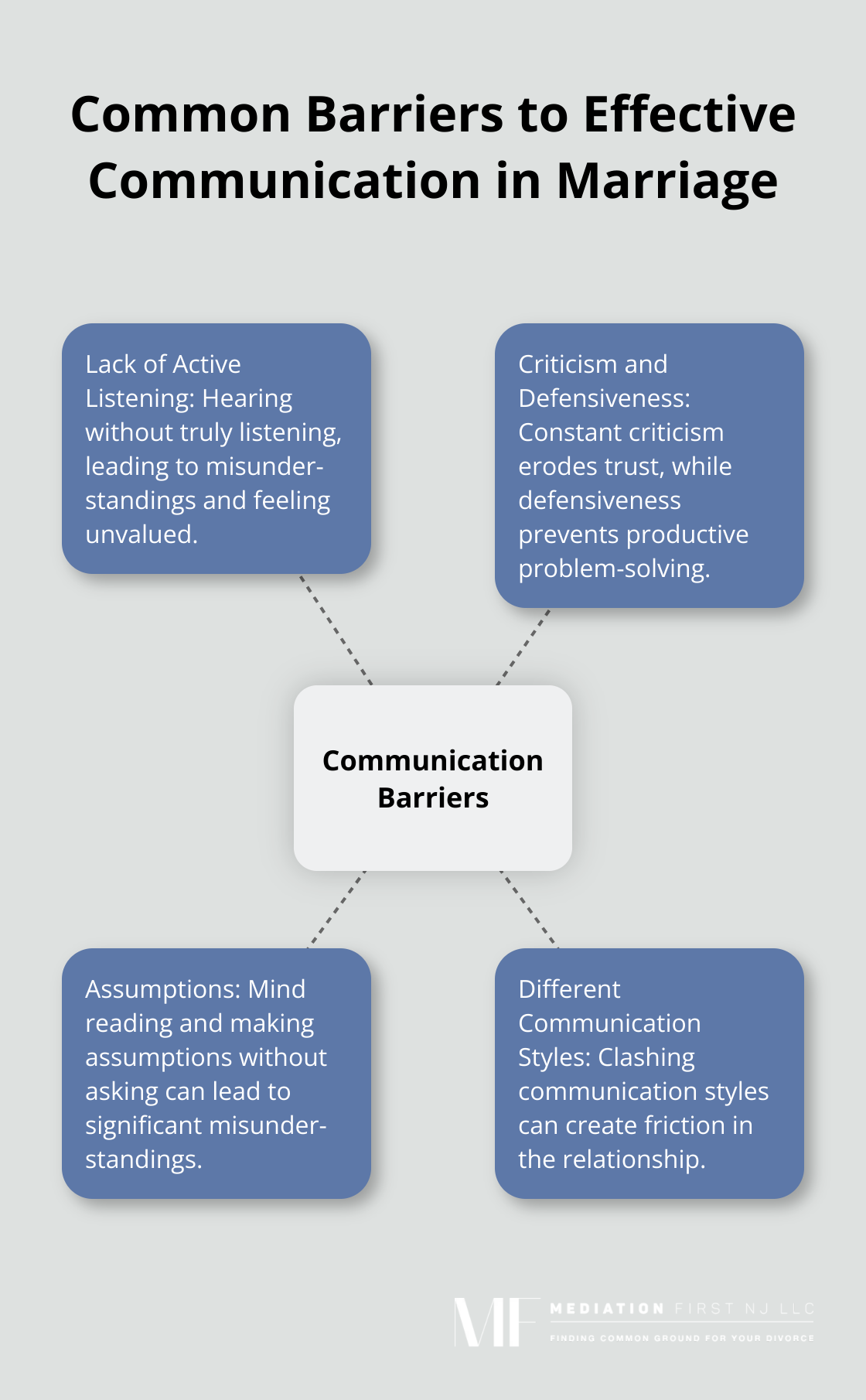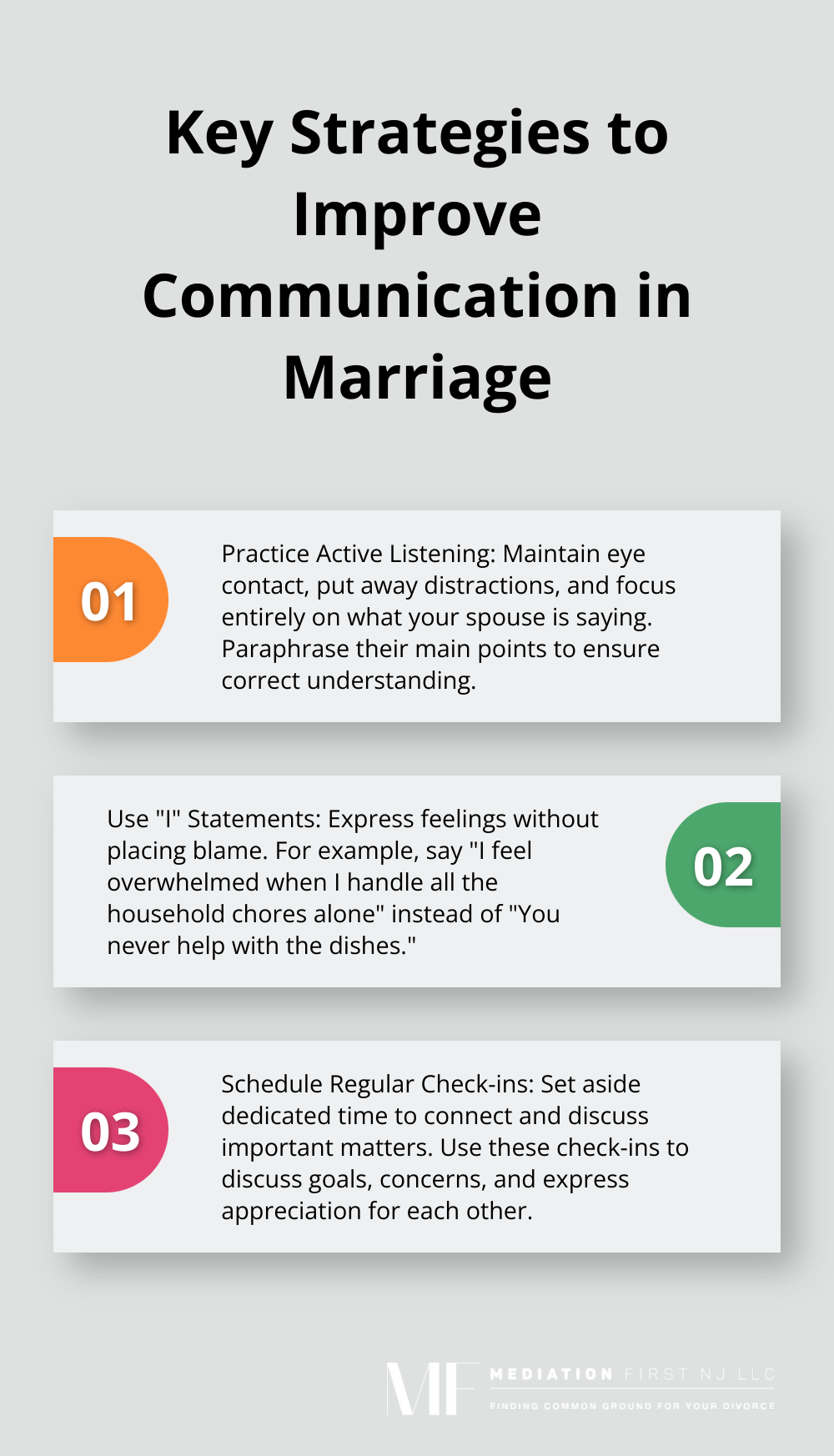Communication in marriage is the cornerstone of a strong, lasting relationship. At Mediation First NJ LLC, we’ve seen firsthand how effective communication can transform struggling marriages into thriving partnerships.
Couples who master the art of open, honest dialogue often experience deeper intimacy, fewer conflicts, and a more satisfying union overall. This blog post explores the vital role of communication in marriage and offers practical strategies to enhance your connection with your spouse.
Why Communication Matters in Marriage
Effective communication serves as the lifeblood of a thriving marriage. A study by the National Marriage Project reveals that couples who communicate well are 50% more likely to report being “very happy” in their relationships. This statistic highlights the profound impact that clear, open dialogue can have on marital satisfaction.

Building a Foundation of Trust
Trust forms the bedrock of any strong marriage, and communication acts as the tool that builds it. When spouses share their thoughts, feelings, and experiences openly, they create an environment of transparency. This openness allows partners to feel secure in their relationship, knowing that there are no hidden agendas or secrets.
Navigating Conflicts with Grace
Misunderstandings and conflicts will occur in any relationship, but how couples handle them can make or break a marriage. Softening the start-up of conversations is crucial to resolving relationship conflicts. Couples who use a soft start-up in their arguments are more likely to have productive conversations and resolutions.
Deepening Emotional Bonds
Regular, meaningful communication fosters emotional intimacy between partners. Dr. John Gottman’s concept of “Love Maps” helps couples develop greater personal insight and a more detailed understanding of each other’s life and world. Daily conversations about hopes, dreams, and fears (both big and small) create a shared emotional landscape that strengthens the bond between spouses.
Enhancing Problem-Solving Skills
Couples who communicate effectively develop stronger problem-solving skills. They learn to approach challenges as a team, pooling their resources and ideas to find solutions. This collaborative approach not only resolves immediate issues but also builds confidence in the relationship’s ability to weather future storms.
Fostering Mutual Growth
Open communication allows partners to support each other’s personal growth and aspirations. When spouses feel comfortable expressing their goals and desires, they can work together to achieve them. This mutual support and understanding (often facilitated through honest conversations) contribute to a sense of partnership and shared purpose in the marriage.
As we move forward, we’ll explore the common barriers that can hinder effective communication in marriage and provide practical strategies to overcome them.
What Hinders Effective Communication in Marriage?
Effective communication forms the foundation of a healthy marriage, but several obstacles can impede this vital aspect of a relationship. Understanding these barriers is the first step toward overcoming them and fostering a stronger connection with your spouse.

The Silent Treatment: When Active Listening Falls Short
One of the most common communication pitfalls in marriages is the lack of active listening. Research shows that relatively satisfied couples engage in more positive, less negative, and more effective communication. However, many spouses fall into the trap of hearing without truly listening. They might be physically present but mentally elsewhere, scrolling through their phones or thinking about work while their partner speaks. This behavior leads to misunderstandings and makes the speaking partner feel unvalued and unheard.
To combat this, couples can implement the “speaker-listener” technique. This method involves one partner speaking while the other listens without interruption, then summarizing what they heard before responding. This practice ensures both parties feel heard and understood.
The Blame Game: Criticism and Defensiveness
Gottman’s research identifies criticism and defensiveness as two of the “Four Horsemen” that predict relationship failure. When couples engage in constant criticism, it erodes trust and creates a hostile environment. Similarly, responding to criticism with defensiveness prevents productive problem-solving.
Instead of using “you” statements that place blame, couples should frame concerns using “I” statements. For example, replace “You never help around the house” with “I feel overwhelmed when I handle all the household chores alone.” This approach expresses feelings without attacking the partner, making them more receptive to finding solutions together.
Mind Reading Mishaps: The Danger of Assumptions
Assuming you know what your partner thinks or feels without asking can lead to significant misunderstandings.
To avoid this, couples should practice direct communication. They should ask clarifying questions when they’re unsure about their partner’s meaning or intentions. It’s better to ask and know than to assume and be wrong.
Lost in Translation: Navigating Different Communication Styles
Each person has a unique communication style shaped by their upbringing, personality, and experiences. When these styles clash, it can create friction in the relationship. For instance, one partner might prefer direct communication, while the other favors a more subtle approach.
Understanding and respecting these differences is essential. Couples should take time to discuss their communication preferences. They should identify areas where their styles differ and work together to find a middle ground that suits both of them.
These communication barriers can escalate conflicts in marriages (as many couples discover). However, recognizing and addressing these common obstacles can significantly improve marital communication. In the next section, we’ll explore practical strategies that couples can use to enhance their communication skills and strengthen their bond.
How Can Couples Improve Their Communication?
The Power of Active Listening
Active listening in a romantic relationship can increase intimacy and understanding between partners, resulting in a more fulfilling and satisfying relationship. To practice active listening, maintain eye contact, put away distractions like smartphones, and focus entirely on what your spouse says. After they finish speaking, paraphrase their main points to ensure correct understanding. This technique shows respect and reduces misunderstandings.
Try to set aside 15 minutes each day for uninterrupted conversation with your spouse, taking turns to speak and actively listen.
Expressing Feelings with “I” Statements
“I” statements express feelings without placing blame. Instead of saying, “You never help with the dishes,” try, “I feel overwhelmed when I handle all the household chores alone.” This approach reduces defensiveness and opens the door for collaborative problem-solving.

Research suggests that I-language is less likely to produce a defensive reaction in a message recipient compared with you-language. To practice this, write down three common complaints you have and rephrase them using “I” statements before discussing them with your partner.
Scheduling Regular Check-ins
Daily life can push communication aside. Scheduling regular check-ins ensures that you and your spouse have dedicated time to connect and discuss important matters. These check-ins can occur daily, weekly, or monthly, depending on your needs and schedules.
During these check-ins, discuss your goals, concerns, and appreciation for each other. Set a recurring calendar reminder for your check-ins to make them a priority.
The Impact of Appreciation and Gratitude
Expressing appreciation and gratitude can significantly improve marital communication. Try to implement a daily gratitude practice where you share three things you appreciate about your spouse. This simple act can shift your focus from what’s wrong to what’s right in your relationship, fostering a more positive communication environment.
Learning the Art of Compromise
Effective communication often leads to compromise, a key skill in any marriage. When facing disagreements, focus on finding solutions that address both partners’ needs rather than winning the argument.
Practice this approach in low-stakes situations to build your compromise skills for more significant issues.
Final Thoughts
Communication in marriage forms the foundation of a strong, enduring relationship. Effective dialogue between partners builds trust, fosters intimacy, and strengthens emotional bonds. Couples can enhance their connection and overcome common communication barriers by implementing active listening, using “I” statements, and scheduling regular check-ins.
Improving communication requires patience, practice, and commitment from both partners. Couples should start by incorporating one or two techniques into their daily interactions and gradually build upon them. This approach will create a more open and understanding environment, making the relationship more resilient and satisfying.
Professional support can prove invaluable for couples facing persistent communication challenges or navigating complex family disputes. Mediation First NJ LLC specializes in guiding couples through difficult conversations and helping them reach mutually beneficial agreements. Our mediation services provide a constructive, cost-effective alternative to traditional litigation, empowering couples to make informed decisions that serve their family’s best interests.

